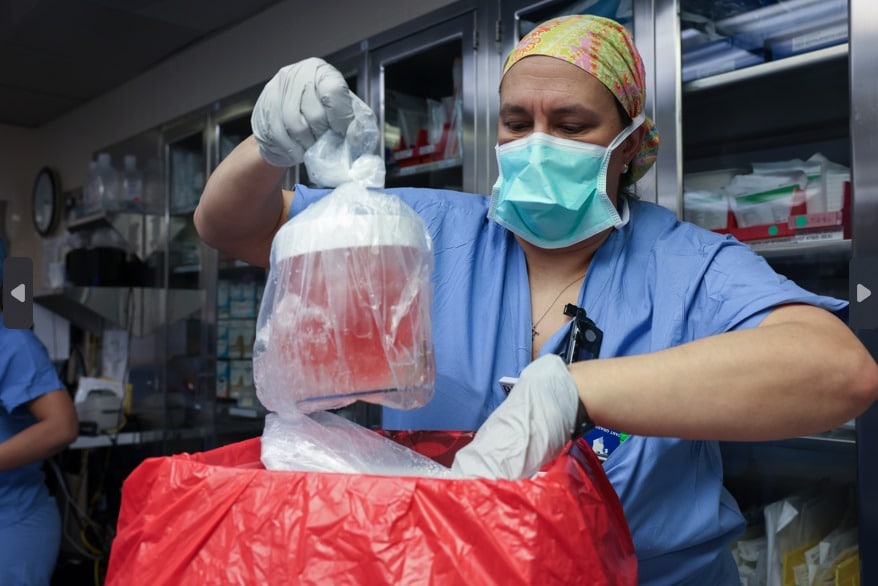Massachusetts General Hospital heralds the first successful transplant of a genetically-edited pig kidney into a 62-year-old patient with end-stage kidney disease.
This pioneering surgery not only showcases the potential of genetic editing in overcoming organ shortages but also sets a new horizon in the realm of xenotransplantation, offering hope to millions worldwide.
The Dawn of a New Era in Transplant Medicine
At the heart of this medical breakthrough is the Massachusetts General Hospital (MGH), a beacon of innovation within the Mass General Brigham healthcare system. On March 16, a team of esteemed surgeons undertook a challenging yet transformative four-hour surgery, marking the world’s first transplantation of a genetically-edited pig kidney into a human being.
The recipient, a 62-year-old male grappling with the life-threatening condition of end-stage kidney disease (ESKD), emerged as the focal point of a historical medical milestone. This procedure not only signifies a major leap forward in addressing the critical shortage of organs available for transplantation but also reaffirms MGH’s position as a global leader in pioneering transplantation services.
This event builds upon Mass General Brigham’s illustrious history of organ transplant milestones, including the first successful human organ transplant in 1954 and the groundbreaking penile transplant in 2016. The institution’s transplantation programs benefit from the collective expertise of world-renowned transplant physicians and scientists. Their collaborative efforts across various disciplines highlights the system’s dedication to advancing medical science and improving patient outcomes across the globe.
Pioneering Leadership and Genetic Innovation
At the helm of this groundbreaking procedure were three esteemed figures: Leonardo V. Riella, MD, PhD, Medical Director for Kidney Transplantation; Tatsuo Kawai, MD, PhD, Director of the Legorreta Center for Clinical Transplant Tolerance; and Nahel Elias, MD, Interim Chief of Transplant Surgery and Surgical Director for Kidney Transplantation. Their combined expertise facilitated the successful transplantation of a genetically-modified pig kidney, tailored with 69 genomic modifications, into a living patient. “Mass General Brigham researchers and clinicians are constantly pushing the boundaries of science to transform medicine and solve significant health issues facing our patients in their daily lives,” remarked Anne Klibanski, MD, President and CEO, Mass General Brigham.
A Collaborative Milestone in Xenotransplantation
The successful kidney transplant was the result of a collaborative effort between MGH and eGenesis, a biotechnology company based in Cambridge, MA. This partnership utilised CRISPR-Cas9 technology to perform 69 genomic edits on the pig kidney, enhancing its compatibility with the human immune system. The pig kidney, carefully engineered to reduce the risk of rejection, represents a significant advancement in the field of xenotransplantation.
Mike Curtis, CEO of eGenesis, expressed his gratitude and excitement about this medical breakthrough, stating, “We are grateful for the courageous contribution of the patient and to the advancement of transplantation science. This represents a new frontier in medicine and demonstrates the potential of genome engineering to change the lives of millions of patients globally suffering from kidney failure.”
This procedure is not only a testament to the power of genetic engineering in medicine but also highlights the potential for xenotransplantation to alleviate the critical shortage of human organs for transplantation. The collaboration between MGH and eGenesis, and their pioneering work, has been extensively documented, culminating in a publication in the prestigious journal Nature in 2023.
Transforming Lives and the Future of Transplantation
The success of this genetically modified pig kidney transplant not only marks a historic milestone in medical science but also opens new pathways for addressing the global organ shortage crisis. It shines a light on the potential of xenotransplantation to provide a lifeline to the thousands of patients waiting for a compatible organ donor. The pioneering efforts of the MGH team, in collaboration with eGenesis, have laid the groundwork for a future where organ scarcity could become a challenge of the past.
The courage and participation of the patient, Mr. Richard ‘Rick’ Slayman, in this pioneering procedure highlight the human aspect of scientific advancement. His willingness to embark on this journey highlights the profound impact that medical innovation can have on individual lives. Mr. Slayman’s story is a testament to the importance of pushing the boundaries of science to improve patient outcomes and quality of life.
As the medical community and the world celebrate this monumental achievement, the focus now shifts to the future possibilities that this successful transplant unlocks. The implications for organ transplantation, patient care, and the ongoing battle against organ shortage are immense. This breakthrough paves the way for more innovative treatments and offers new hope to patients worldwide.
With this historic milestone, Massachusetts General Hospital and its partners have once again demonstrated their commitment to advancing medicine and solving some of the most pressing health challenges facing humanity. The journey of xenotransplantation, from concept to reality, represents a remarkable testament to the power of collaboration, innovation, and the relentless pursuit of saving lives.
Image credit: Massachusetts General Hospital
References
- World’s First Genetically-Edited Pig Kidney Transplant into Living Recipient Performed at Massachusetts General Hospital. (n.d.). Massachusetts General Hospital. https://www.massgeneral.org/news/press-release/worlds-first-genetically-edited-pig-kidney-transplant-into-living-recipient













